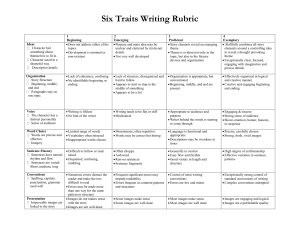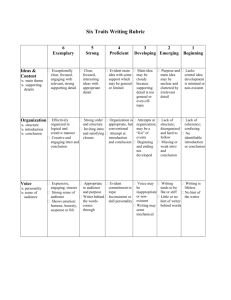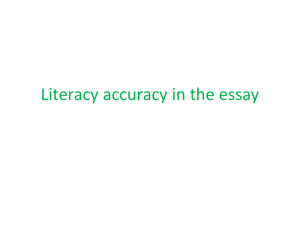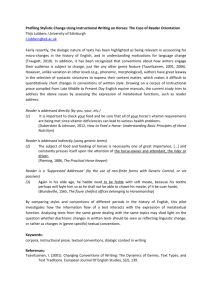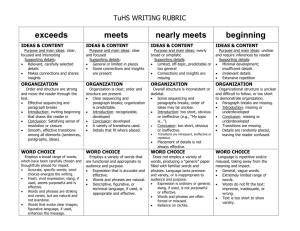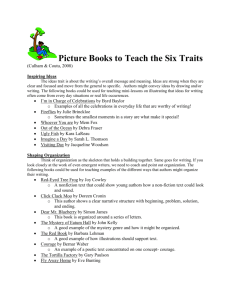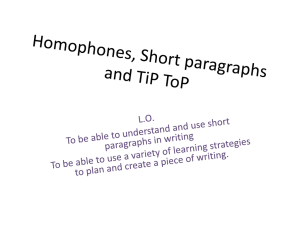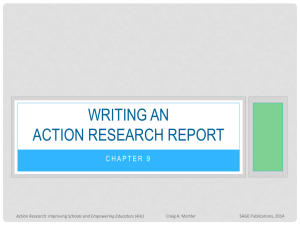Holistic Scoring Rubric SCORE POINT 6 Response is sophisticated
advertisement
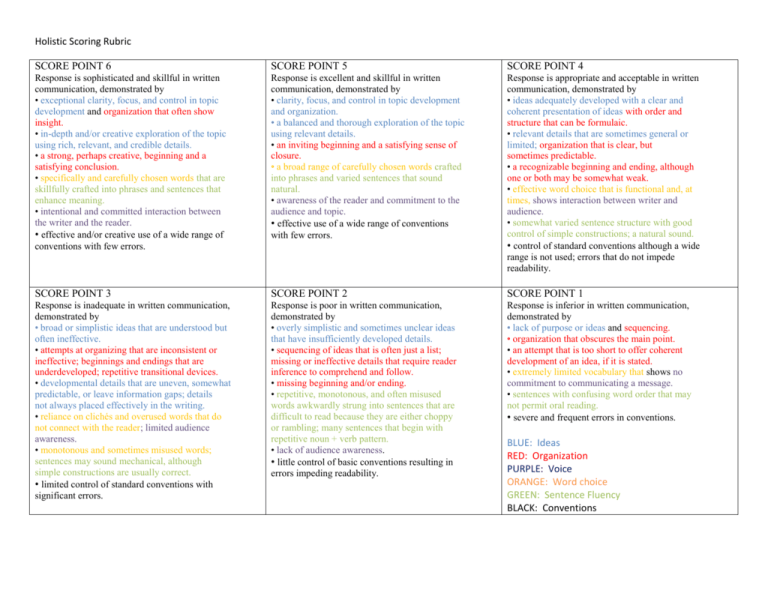
Holistic Scoring Rubric SCORE POINT 6 SCORE POINT 5 SCORE POINT 4 Response is sophisticated and skillful in written communication, demonstrated by • exceptional clarity, focus, and control in topic development and organization that often show insight. • in-depth and/or creative exploration of the topic using rich, relevant, and credible details. • a strong, perhaps creative, beginning and a satisfying conclusion. • specifically and carefully chosen words that are skillfully crafted into phrases and sentences that enhance meaning. • intentional and committed interaction between the writer and the reader. • effective and/or creative use of a wide range of conventions with few errors. Response is excellent and skillful in written communication, demonstrated by • clarity, focus, and control in topic development and organization. • a balanced and thorough exploration of the topic using relevant details. • an inviting beginning and a satisfying sense of closure. • a broad range of carefully chosen words crafted into phrases and varied sentences that sound natural. • awareness of the reader and commitment to the audience and topic. • effective use of a wide range of conventions with few errors. Response is appropriate and acceptable in written communication, demonstrated by • ideas adequately developed with a clear and coherent presentation of ideas with order and structure that can be formulaic. • relevant details that are sometimes general or limited; organization that is clear, but sometimes predictable. • a recognizable beginning and ending, although one or both may be somewhat weak. • effective word choice that is functional and, at times, shows interaction between writer and audience. • somewhat varied sentence structure with good control of simple constructions; a natural sound. • control of standard conventions although a wide range is not used; errors that do not impede readability. SCORE POINT 3 SCORE POINT 2 SCORE POINT 1 Response is inadequate in written communication, demonstrated by • broad or simplistic ideas that are understood but often ineffective. • attempts at organizing that are inconsistent or ineffective; beginnings and endings that are underdeveloped; repetitive transitional devices. • developmental details that are uneven, somewhat predictable, or leave information gaps; details not always placed effectively in the writing. • reliance on clichés and overused words that do not connect with the reader; limited audience awareness. • monotonous and sometimes misused words; sentences may sound mechanical, although simple constructions are usually correct. • limited control of standard conventions with significant errors. Response is poor in written communication, demonstrated by • overly simplistic and sometimes unclear ideas that have insufficiently developed details. • sequencing of ideas that is often just a list; missing or ineffective details that require reader inference to comprehend and follow. • missing beginning and/or ending. • repetitive, monotonous, and often misused words awkwardly strung into sentences that are difficult to read because they are either choppy or rambling; many sentences that begin with repetitive noun + verb pattern. • lack of audience awareness. • little control of basic conventions resulting in errors impeding readability. Response is inferior in written communication, demonstrated by • lack of purpose or ideas and sequencing. • organization that obscures the main point. • an attempt that is too short to offer coherent development of an idea, if it is stated. • extremely limited vocabulary that shows no commitment to communicating a message. • sentences with confusing word order that may not permit oral reading. • severe and frequent errors in conventions. BLUE: Ideas RED: Organization PURPLE: Voice ORANGE: Word choice GREEN: Sentence Fluency BLACK: Conventions

